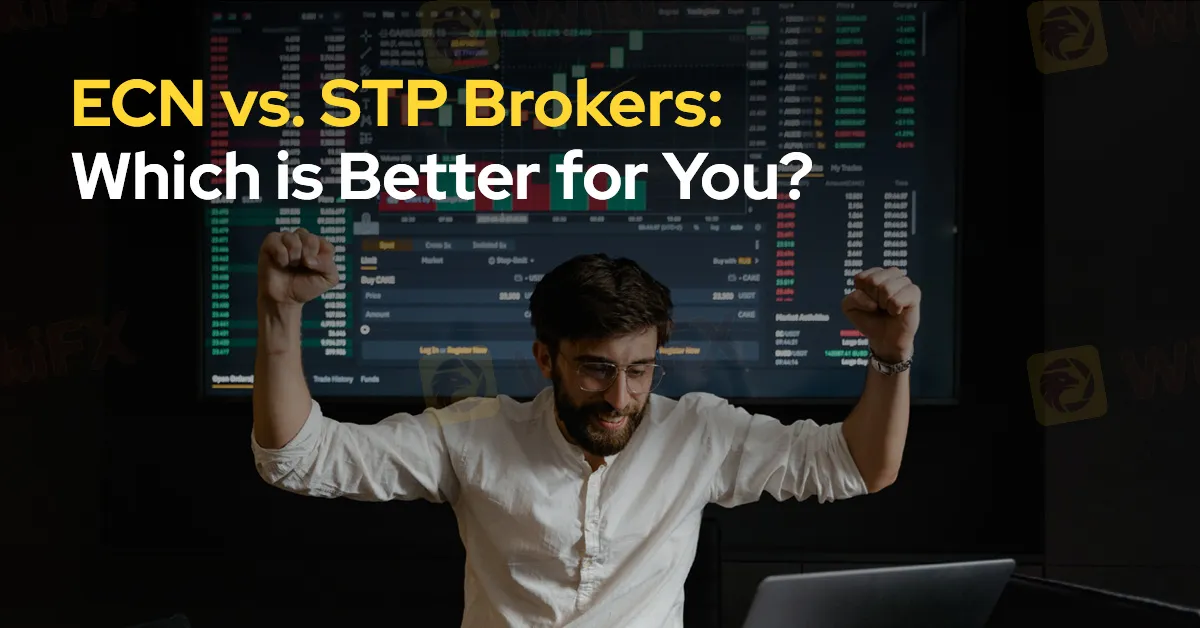简体中文
繁體中文
English
Pусский
日本語
ภาษาไทย
Tiếng Việt
Bahasa Indonesia
Español
हिन्दी
Filippiiniläinen
Français
Deutsch
Português
Türkçe
한국어
العربية
ECN vs. STP Brokers: Which is Better for You?
Abstract:The most common types of broker are ECN (Electronic Communication Network) and STP (Straight Through Processing). Both offer unique advantages, but which is better? In this article, we’ll explore the differences between these two broker types and their benefits, helping traders make an informed decision.

In the world of online trading, selecting the right broker can be crucial to your success. One of the key factors to consider is the type of broker you choose to work with. The most common types are ECN (Electronic Communication Network) and STP (Straight Through Processing). Both offer unique advantages, but which is better? In this article, well explore the differences between these two broker types and their benefits, helping traders make an informed decision.

ECN brokers offer traders direct access to the market by connecting them with liquidity providers such as banks, hedge funds, and other traders. These brokers act as intermediaries without taking positions against the trader, which can eliminate conflicts of interest.
One of the key advantages of an ECN broker is that they offer tight spreads, especially during periods of high market liquidity. ECN brokers allow for real-time order execution, which is attractive to traders who focus on quick trades, such as scalpers or high-frequency traders.
Transparency is another major benefit of ECN brokers. They display the depth of the market, showing the available buy and sell orders, which provides greater insight into market sentiment. This can give traders more confidence in their trading strategies.
However, ECN brokers typically charge a commission per trade, which can add up, especially for high-volume traders. Additionally, the spreads may widen during times of low liquidity, which could be a disadvantage for traders looking to avoid high trading costs.

STP brokers, on the other hand, use Straight Through Processing to route client orders directly to liquidity providers without any intervention from a dealing desk. Unlike ECN brokers, they may offer variable spreads that can adjust based on market conditions.
One of the main advantages of STP brokers is the simplicity they offer. Orders are routed efficiently, allowing for fast execution, which can be beneficial in fast-moving markets. Unlike market makers, who may take the opposite side of your trade, STP brokers typically pass orders to liquidity providers, reducing the chance of a conflict of interest.
STP brokers also appeal to a wide range of traders due to the absence of commissions on many platforms. Instead, they make money through slightly wider spreads. This makes them attractive to retail traders who want to avoid upfront costs. However, during periods of volatility or low liquidity, STP spreads can widen, potentially increasing trading costs.

The choice between an ECN or STP broker largely depends on a trader's style and priorities. For scalpers and high-frequency traders who need low spreads and high liquidity, ECN brokers may be the best option. Their transparency and ability to avoid conflicts of interest can also be a significant draw for experienced traders.
On the other hand, STP brokers can be ideal for traders looking for fast execution with minimal involvement in the technical side of trading. Retail traders who prioritize simplicity and wish to avoid commission fees might find STP brokers more appealing.
In conclusion, there is no one-size-fits-all answer. Traders should carefully evaluate their own needs, including trading style, market conditions, and tolerance for fees, when choosing between an ECN or STP broker. Both types offer distinct advantages, and the best choice depends on aligning those with personal trading goals.

Disclaimer:
The views in this article only represent the author's personal views, and do not constitute investment advice on this platform. This platform does not guarantee the accuracy, completeness and timeliness of the information in the article, and will not be liable for any loss caused by the use of or reliance on the information in the article.
Read more

Reviewing CFreserve - Regulation Status, Operation Period & More
Has CFreserve deceived you financially? Did you face problems regarding forex investment withdrawals with this broker? You’re not alone! Read this exposure story to know how it's duping investors.

Trading 212 Expands German Footprint with New Berlin Office
Trading 212, a leading Forex trading broker, strengthens its presence in Germany with a new Berlin office. Discover how the platform is shifting focus from CFDs to stockbroking and tax-efficient savings.

Govt Imposes Import Curbs on Precious Metal to Stop Liquid Gold Inflow
As the illegal inflow of gold rose in India, the government has decided to impose import curbs on various colloidal precious metals. Check out our story on this.

Hantec Markets Partners with Swiset to Enhance Trader Tools
Hantec Markets and Swiset collaborate to bring trader insights, gamified features, and advanced performance analytics to Forex trading platforms, including the launch of 24/7 cryptocurrency CFD trading.
WikiFX Broker
Latest News
OneRoyal Expands to Oman, Strengthening Forex Trading in MENA
Govt Imposes Import Curbs on Precious Metal to Stop Liquid Gold Inflow
Reviewing CFreserve - Regulation Status, Operation Period & More
Starlink rival Eutelsat pops 22% as France backs capital raise
The Fed held interest rates steady, but some credit card APRs keep going up. Here's why
Meta, EssilorLuxottica unveil Oakley smart glasses
Important Statement on the Authenticity of WikiFX Score and Broker Reviews
JPMorgan to Launch JPMD Deposit Token
Kroger's shares rise as grocer says shoppers seek lower prices, cook more at home
Circle shares extend their rally after Senate passes landmark stablecoin bill
Currency Calculator


